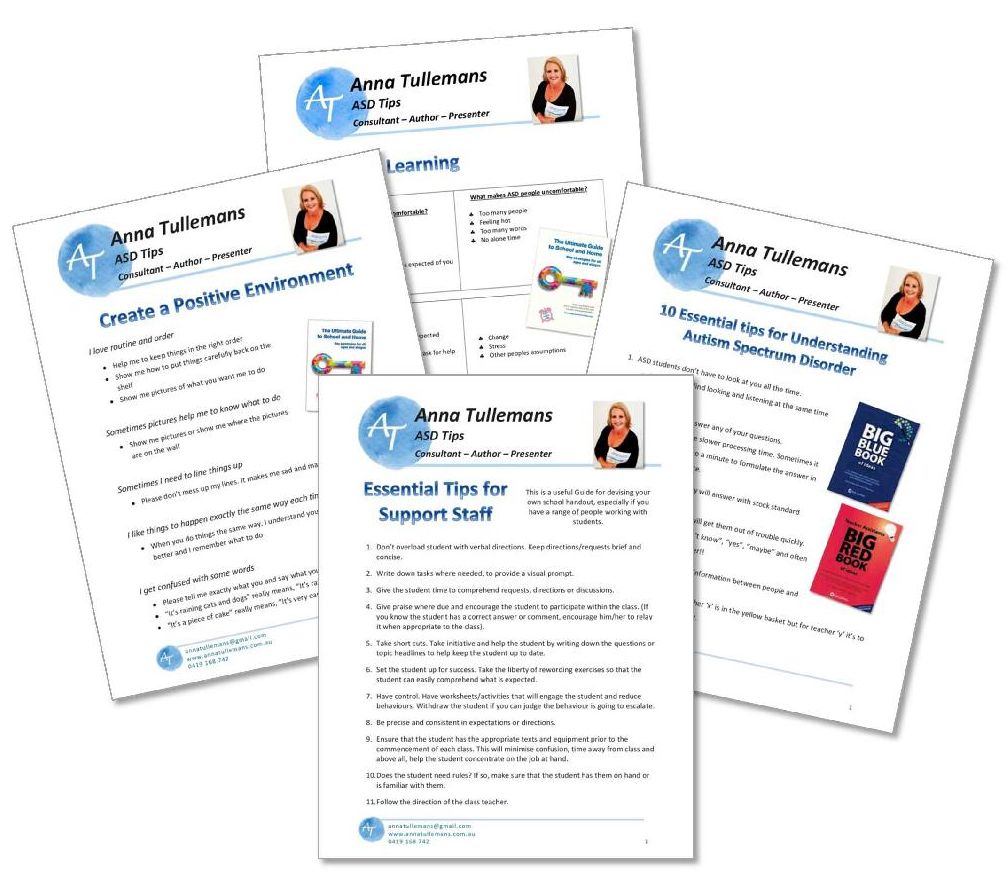ASD and Learning
10 Essential tips for Understanding Autism Spectrum Disorder
- ASD students don’t have to look at you all the time.
- Give them time to answer any of your questions.
- Asperger people need positive feedback to know they are on the right track.
- More in the document…
Create a Positive Environment
I love routine and order
- Help me to keep things in the right order
- Show me how to put things carefully back on the shelf
- Show me pictures of what you want me to do
Create a Positive Partnership with Teachers (-Parents)
The relationship between parent and school is ideally a solid partnership, with all participants working effectively for the benefit of the child with ASD.
Girls on the Spectrum
Girls on the spectrum are better at masking their condition – they do this by copying the behaviours of others. Behaviour is often less ‘obvious’ for someone not familiar with ASD girls. Some great tips to identify and understanding how girls differ from boys.
Help the Student to End the Day
Transitioning the student to after school is an important part of the day. To end the day on a good note helps the student to remain calm and return the next morning ready for learning.
The Importance of Being Perfect
Students with Autism Spectrum Disorder (ASD) can, and usually have a problem with, perfection and everything being perfect. That is perfection as perceived by them.
Due to their literal thinking styles and unconventional ways of problem solving, their concept of something being perfect is very different from ours. This can lead to many problems at home and especially at school.
Inclusion - Essential Strategies
Ten Essential Strategies to provide inclusion of the student in the classroom and socialising in the playground.
Motivators
Self-motivation is very difficult for someone with ASD especially when they can’t see the “payoff” at the end. Having a special goal to work towards has been the best motivator for our students.
Positive Behaviour Support
Ten Essential Strategies
The Power of Preventative Breaks
There are a range of strategies you can use for breaks and here are some to get you started:
- Sensory
- Physical
- Relaxation
- Diversion
- Solitude
Preparing The Classroom
- Classroom support for teacher (training, etc)
- Assistance to set up structured environment
- Curriculum Planning (IEPs etc)
- Whole School STAFF
- Professional Development for Teacher and Assistant
Substitute Teachers
When change is about to happen it is important to notify particular teachers and staff so they are aware of the difficulties that this student will face and to be aware to look for signs of anxiety.
Support Staff - Essential Tips
This is a useful Guide for devising your own school handout, especially if you have a range of people working with students.
Teacher and Parent Relationship
When a partnership is formed between teachers and parents, the students see the value in education and education related activities such as homework and revision.
Understanding ASD - 10 Essential Tips
10 Essential tips for Understanding Autism Spectrum Disorder

Assignment Cheat Sheet
Assignment sheet keeps all the information in one place.
Assignment Proforma
Assignment sheet keeps all the information in one place.
Now - Next - Later
Now – Next – Later… A simple to use page to help the child understand what is expected over a short time frame.
Also available for free download is My Weekly Planner eBook.
Excursions Proforma
The Excursions Proforma can be used for preparation of the excursion, the activities and emotional well-being.
Student Profile Summary Proforma
This summary may help provide information on the strengths and challenges. Triggers may cause meltdowns and this could list some helpful strategies to manage issues.
Creating Opportunities for Friendship
We need to find friendship opportunities in places where the ASD person feels comfortable and not force the situation. An ideal situation is while the ASD person is engaging in an activity that they enjoy.
Friendships
As we teach friendship skills, we also need to teach that friendships grow and change, and so we need to guide them through the different stages of friendships as some friendships wane and others become much closer. This can be taught if you have established a mentor relationship with the student.
Buddy Certificate
Give this as a reward for appreciation of helping.
Maintaining Friendships
When a friendship has formed, many ASD people will forget to maintain and reciprocate this friendship. We need to give them “ideas” and “how to instructions”.
We need to remind them with each new situation so they can build up a repertoire of scenarios where they will feel comfortable in using these “instructions”.
